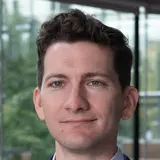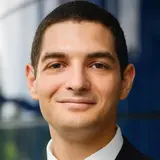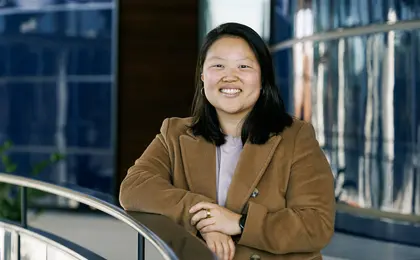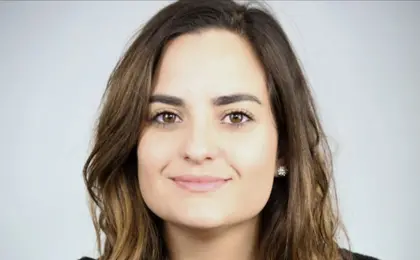Voices of Veterans at Yale SOM
Admissions Ambassador Aditi Banerjee ’23 sat down with Yale SOM community members and U.S. military veterans Reed Dibich ’23, Spenser Tessmann ’22, and Vera Wang ’22 to learn more about their service, what drew them to SOM, and their plans post-MBA.



What motivated you to join the military?
Spenser Tessmann ’22: I joined the military for fairly “traditional” reasons: wanting to serve, wanting to be a part of something larger than myself, and wanting to develop as a leader at the same time. That turned into almost 10 years in the Navy, where I got to meet a huge variety of people, live all over the place (Hawaii; California; Washington, D.C.; and Italy!), see much more of the world than I could have imagined when I joined, and do some pretty cool things. I started as an officer on a ship based in Pearl Harbor, then spent time managing base operations, and finally coordinated international military cooperation. There were also a lot of less interesting times, and at the end of it all I was ready to leave and see more of the “real” world.
Reed Dibich ’23: I served four years in the Marine Corps infantry alongside some of the best and brightest America has to offer. In many ways, the U.S. military has more talent in its ranks than it knows what to do with. I joined out of a sense of purpose to give back, because this country has given my family so much. I thought the Marines would also take me on an adventure and teach me a few things about leadership—it definitely delivered.
Vera Wang ’22: I worked at JPMorgan’s Asset and Wealth Management New York office prior to SOM while serving in the U.S. Army National Guard as a financial management specialist. I highly appreciate my military experience, as I learned greatly about leadership, teamwork, and resiliency. It also provided me with an excellent opportunity to get involved in the community.
What is one highlight from your time in the military?
Tessmann: At the end of my first deployment, I was on the late-night/early morning navigation shift as we made the final approach to Pearl Harbor, our home port. Watching the sun rise over O’ahu after being away for months was a powerful, emotional experience that I’ll never forget.
Wang: One of the many highlights from my time in the military was leading my platoon during basic training. As an Asian female, I struggled a lot with language and cultural barriers when I first joined the basic training. However, I was able to gain lots of support and trust from my peers to be voted as the platoon leader and fight alongside each other to graduate from boot camp. I walked in front of the formation when we returned to base from the three-day field training exercise. We ruck-marched in the pouring rain in the middle of night. I saw the tears and joy on my battle buddies’ faces. It was like a movie scene.
Why did you choose to come to business school, and why SOM?
Tessmann: I knew I wanted to broaden my horizons from a solely military focus, but also that I had very little knowledge of the world beyond the military. An MBA seemed critical to both gaining that knowledge and connecting with firms from which to launch the next phase of my career. SOM in particular stuck out because of its smaller class sizes, community feel, and focus on business and society. Like many other veterans, one of my major motivations for joining the military was the idea that it was a service to society, and I wanted to become part of a community who also had a focus on different aspects of service.
Dibich: SOM’s mission is to educate leaders for business and society. This mission resonated with me because I believe that the promise of economic activity is to produce a rising tide that lifts all boats. Business leaders have a responsibility to society, and SOM strives to educate its students as broadly as possible. This sort of education is ideal for the entrepreneurial, intellectually curious, and community-minded future business leader.
Wang: I came to business school to broaden my horizon, gain exposure to various industries, and build a strong global network. SOM is a magical place where everyone I talked to while applying was deliberately eager to come. I wanted to be part of a community where I felt a strong sense of belonging during my MBA, as well as post-MBA. I knew it was a community where I would find many people who shared similar values to mine and where we would learn from each other. More importantly, I felt strong support and welcome from faculty members, current students, and alumni. Last, the easy access to classes at other Yale graduate schools will help me become a well-rounded business leader.
At SOM, I have been working on my startup, Sweetgum, which will enable individual contribution and reward in the global voluntary carbon market. We are creating a virtual world where players can develop, participate in, and receive rewards from individual carbon offset projects on the Ethereum blockchain using the platform’s utility token OCO. I have always had a strong passion in entrepreneurship. During my first year at SOM, I was highly involved in the Yale Startup community and participated in the Tsai CITY Accelerator. Currently, I am both a full-time student and full-time entrepreneur. I am actively learning in the blockchain and carbon credit space.
What do you hope to do post-MBA? What resources have you leveraged at SOM during your career pivot?
Tessmann: I am going into consulting with Bain & Company post-MBA. I wanted to continue to work on varied problems with big industry players while at a firm which values a sense of community and collaborative support. Bain seems like an excellent place to do those things. During my time at SOM, the education provided by the Consulting Club was critical to that success, and the support offered by the Veterans Club significantly eased the process.
Wang: I hope to learn more about strategic business decisions while delivering positive change to society post-MBA. Thus, I will be joining McKinsey’s New York office post-MBA. During my career pivot, many alumni kindly offered their time to help me get a better understanding about the work and the industry. I also leveraged our Consulting Club and Career Development Office for excellent training curricula, as well as peers who are from the consulting industry, to get to know the different perspectives about consulting and recruiting preparations.
What advice do you have for other veterans looking to pursue an MBA degree at SOM?
Tessmann: SOM is a great place for veterans to find a community of people who are also strongly interested in service to society, and I would strongly encourage applying. Reach out to the Veterans Club, and we will be happy to help you with the process!
Dibich: Two pieces of advice: First, veterans have a unique perspective to contribute to the classroom. Many veterans I know don’t think they’re Yale material, but they absolutely are. Yale SOM desires candidates with real experience, and veterans have a lot to offer. If you’re a veteran, reach out to me and let me know how I can help you. Second, when you arrive on campus, be sure to listen as much as you can. Your classmates have extraordinary backgrounds, stories, and experiences. You have an excellent, yet fleeting, opportunity to learn more about the world.
Wang: Get connected with our SOM Veterans Club and talk with people from similar backgrounds. Feel free to reach out to me at any time, as well!


